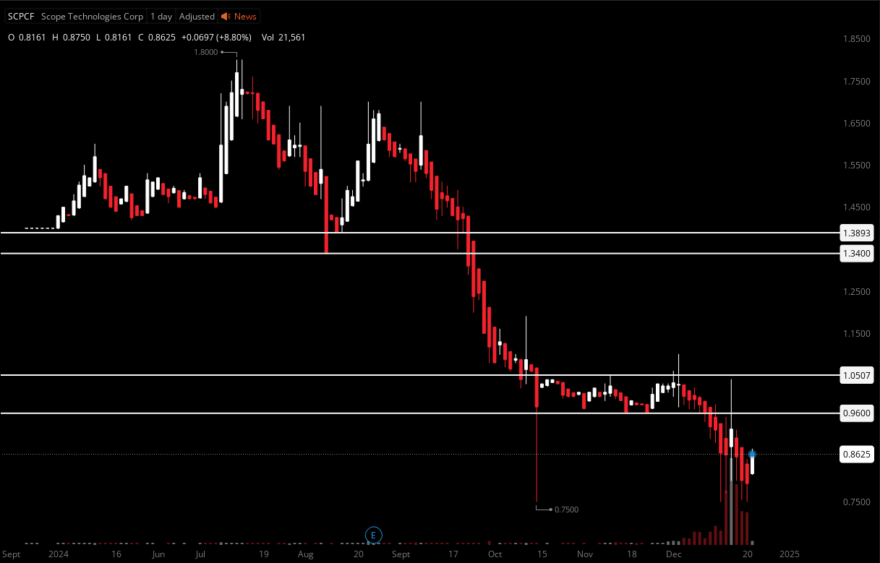LATEST NEWS
Scope Technologies Signs Master Reseller Agreement with Coegi Cloud AB to Expand Quantum Security Solutions Across IT and Cloud Markets
5 Key Reasons Why the Time to Invest in Scope Technologies (CSE: SCPE | OTCQB: SCPCP) is Now…
Shocking Quantum Breakthroughs from Google and Microsoft Drive Cybercrime Fears … and a $2 Trillion Cybersecurity Boom for Investors
As the costs associated with hacks, data breaches and ransomware attacks skyrocket, some experts predict that desperate companies will soon be spending $1.5 trillion to $2 trillion a year to fight it. And one little-known company with an advanced cybersecurity technology could be positioned to become a player in that market.
In August 2024, news outlets around the world revealed one of the most shocking data breaches in recent history.
Approximately 2.9 billion records, including names, email addresses, phone numbers, mailing addresses, financial data and, distressingly, Social Security numbers, were stolen when Coral Springs, Florida, firm National Public Data (NPD) suffered a massive cyberattack. The company confirmed that the breach, which happened in December 2023, resulted in the potential leaks of data in the summer of 2024.
Nearly every day in the news, yet another damaging data breach or ransomware attack puts valuable data into the hands of hackers.
As bad as this is, it’s a day at the beach compared to what’s potentially coming.
That’s because hostile nations across the globe — including Iran, North Korea, Russia and China — are going all-out to develop a breakthrough technology that will unlock what’s being called the “Master Key” to the Internet.
And recent news from Google and Microsoft indicate that the era of this new technology might be closer than expected.
Scope Technologies Corp.
(CSE: SCPE | OTCQB: SCPCF)
A Cyber Catastrophe in the Making


Anyone with access to this new technology will be able to…
- Access every bit of personal financial, health and other data about everyone on the planet
- Hack into just about anything … endangering critical infrastructure and perhaps even changing future election results
- Potentially access government computers, thus exposing all manner of secret information and endangering national security
Virtually anything connected to the Internet will be vulnerable to attack.
The Deadly Danger of State-Sponsored Hackers
State-sponsored hackers already play a massive role in disrupting the interconnected digital world.
- In March 2022, hackers affiliated with the North Korean government penetrated a computer network used by the video game company Axie Infinity and made off with $620 million in cryptocurrency.
- In early 2024, Midnight Blizzard, a group of Russian state-sponsored hackers, breached one of Microsoft’s core computer systems and stole sensitive information, which helped them gain access to data at the U.S. Department of Veterans Affairs and two other government agencies.
- In January 2024, Jen Easterly, director of the Cybersecurity and Infrastructure Security Agency (CISA), told a Congressional Committee that hackers affiliated with China had penetrated aviation, water, energy and transportation infrastructure.
Data Breaches Happen Almost Daily
Data breaches routinely expose all sorts of personal information including Social Security numbers, bank account details, medical records, passwords, credit card numbers and more.
Rising Tide of Cybercrime Brings Big Profits to Investors in Select Cybersecurity Companies
The cybersecurity business is booming as companies, governments and wealthy individuals desperately try to protect their secrets and data.
Over the past five years…
- Investors who bought Check Point Software Technologies (NASDAQ: CHKP) in February 2020 have made 89.66% on their money.
- They would’ve done even better with CyberArk Software (NASDAQ: CYBR), which nearly tripled as it shot up 247.49%…
- And better still with Palo Alto Networks (NASDAQ: PANW), making better than five times their money as it shot up 385.41%.
Scope Technologies Corp.
(CSE: SCPE | OTCQB: SCPCF)
An Even Bigger Threat is Around the Corner


Even as cybersecurity firms work frantically to defeat today’s hackers… a new menace is beginning to rear its ugly head.
This computing tool is so fast and powerful that every single modern encryption method will be rendered useless — in essence, a “Master Key” to anything connected to the Internet.
Countries hostile to the United States — including China — are spending billions of dollars to develop this technology and weaponize it.
No Password Will Be Safe and Every Secret Will Be Exposed
This breakthrough threatens to throw cybersecurity defenses into chaos as traditional safeguards quickly crumble before its speed and power.
This “Master Key” is called “Quantum Computing.”
Quantum computers will be so fast and so powerful that they’ll have the ability to break any password or key and quickly crack even today’s most advanced encryption algorithms.
These quantum computers are literally — not figuratively — a billion times faster than conventional computers at cracking cryptographic encryptions.
Once hostile foreign powers gain access to it, top secret information critical to U.S. national security will be at risk.
New Technology Makes Encryption Secure Again
One junior company has developed technology that makes encrypted files impenetrable by quantum computers.
That company is Scope Technologies Corp. (OTCQB: SCPCF; CSE: SCPE). Its technology uses random streams of “entropy” to instantly create 100% unbreakable passwords and keys that put quantum hackers back on their heels.
This technology was developed by Swiss computing expert Sean Prescott, Scope Technologies’ Chief Technical Officer. Prescott worked at Switzerland’s Federal Intelligence Service and later in cybersecurity for the Swiss banking system.
As companies become more aware of the quantum threat and begin adopting this technology, Scope Technologies Corp. could see significant business growth.
Scope Technologies Corp.
(CSE: SCPE | OTCQB: SCPCF)
Quantum Computers: A Blessing and a Curse


Quantum computers will also bring many benefits thanks to their astonishing speed.
These computers will solve complex equations that would take a conventional supercomputer centuries in just minutes.
This capability will lead to massive breakthroughs in fields such as:
- Medicine: Quantum computers will speed the development of new drugs and vaccines that save lives
- Materials Science: They will help scientists develop new materials that are lighter, stronger, more efficient and environmentally friendly
- Artificial Intelligence: Quantum computing will allow AI to become far more capable than anything seen before
Unfortunately, hostile nations and bad actors will weaponize quantum computing to destroy the ability to keep information safe and private.
Scope Technologies Has a 100% Quantum-Safe Solution
Scope Technologies Corp. has developed a family of services that provide quantum-resilient encryption for data of all kinds.
These include:
- Quantum Entropy as a Service (QEaaS): Provides quantum-secure random numbers for cryptographic use
- Quantum-Proof Cloud Storage: Quantum-resilient storage for personal and business use
- Authentication & Messaging Services: Secure email, document verification and file transfer solutions
- SDK for Developers: A simple development kit that allows software companies to easily integrate Scope’s quantum-resilient technologies into their own software
Scope Technologies’ revolutionary system provides security and integrity for sensitive data — even after quantum computers become widespread.
Swiss-Made Cybersecurity Technology
Scope’s cybersecurity system was developed by Swiss computing expert and Scope Chief Technical Officer Sean Prescott.
He worked at Switzerland’s Federal Intelligence Service and later in cybersecurity for the Swiss banking system, where billions of dollars move daily and security is paramount.
The Right Company at the Right Time
Quantum computing is the most dangerous new threat ever faced in the history of cybersecurity.
Hackers are already wreaking havoc around the globe, and quantum computing will make the current cybercrime epidemic exponentially worse.
Yet this massive problem creates a massive business opportunity.
In 2023, global cybersecurity spending was estimated to be around $220 billion.
According to cybersecurity executives and analysts at firms such as Morgan Stanley and Bloomberg Intelligence, that number is expected to grow to as much as $2 trillion per year.
This could provide a massive tailwind for companies that offer effective cybersecurity solutions.
The Takeaway
Scope Technologies Corp. (OTCQB: SCPCF; CSE: SCPE) has developed a quantum-safe cybersecurity platform that provides encryption, data protection and authentication services.
Its revolutionary system provides protection and integrity for sensitive data — even after quantum computers become widespread.
As awareness of the quantum threat grows, Scope Technologies could be well-positioned to become an emerging player in the booming cybersecurity market.
IDENTIFYING THE OPPORTUNITY


THE UPSIDE POTENTIAL
With a float of 43M and few restricted shares, a little bit of investor interest could send this soaring!
KEY LEVELS
Key Level #1: $0.9600 (+11.52%)
Key Level #2: $1.0507 (+22.06%)
Key Level #3: $1.3400 (+55.67%)
Key Level #4: $1.3893 (+61.40%)
Support: $0.7500
Introducing the Management Team of Scope Technologies Corp.
(CSE: SCPE | OTCQB: SCPCF)


James Young, CEO
Jim is a seasoned entrepreneur and executive with more than 25 years of experience in Sales Management, Team Building, and Operations leadership across a number of industries including telecom, print publishing, digital publishing, digital advertising and software development.
Some of his career highlights include Director of Operations at the largest call center in Western Canada from 1998 to 2005.
From there he went on to found, operate, and successfully exit a call center that served some of the largest newspaper publishers in North America.
Jim next took on the role of Director of Operations for NativeAds.com. He built and led the company’s ad network as it grew to serve approximately 10 billion ad requests per day.
Jim’s entrepreneurial spirit shone through again when he founded and successfully exited Market Jar Media Inc., a digital publishing house.


Sean Prescott, Chief Technical Officer:
Sean is the computer genius behind Scope Technologies Corp’s technology platform, including the software which generates quantum-proof encryption keys and passwords.
Sean has long history history of developing and launching tech-innovations which range from real-time end-to-end quantum-resilient communication encryption frameworks and high-performance/high-security order and payment routing systems, to sophisticated artificial intelligence and machine learning frameworks.
Sean was born and raised in Zurich, Switzerland and has more than two decades of experience in the enterprise information technology and banking industry where he has established a wide range of complex project knowledge as a CTO, program manager, software engineer, contractor, consultant, and security analyst. He also worked at Switzerland’s Federal Intelligence Service — widely known as “Switzerland’s NSA.”


Alan Tam - CFO & Director
Alan Tam is a senior executive involved with structuring, planning and execution of IPOs, RTOs and CPCs. Mr. Tam, with over 20 years of experience, has been involved in financing, operations, corporate services, mergers and acquisitions, and investor relations for multiple public companies in the past 10 years.
Sources
- Source 1: https://www.theinvestmentjournal.com/scopetechnologies/?utm_campaign=scpcf_drct_by&utm_medium=social&utm_source=investingchannel&utm_term=social&utm_content=scpcf_ir_tech
- Source 2: https://www.scopetechnologies.io/team
- Source 3: https://www.scopetechnologies.io/investors#presentation
- Source 4: https://www.scopetechnologies.io/products-qse
- Source 5: https://www.ibm.com/topics/quantum-cryptography
- Source 6: https://www.scopetechnologies.io/
- Source 7: https://www.scopetechnologies.io/products-gem
- Source 8: https://finance.yahoo.com/quote/SCPCF/
- Source 9: https://www.scopetechnologies.io/news
Disclaimer
Disclaimer
Stock Research Today is a project of Virtus Media Group LLC and intended solely for entertainment and informational purposes. This website / media webpage is owned, operated and edited by Virtus Media LLC. Any wording found on this website / media webpage or disclaimer referencing “I” or “we” or “our” or “Virtus Media” refers to Virtus Media LLC. This website / media webpage is a paid advertisement, not a recommendation nor an offer to buy or sell securities. By reading our website / media webpage you agree to the terms of this disclaimer, which are subject to change at any time. We are not registered or licensed in any jurisdiction whatsoever to provide investment or brokerage advice or anything of an advisory or consultancy nature and therefore are unqualified to give investment recommendations. Always do your own research and consult with a licensed investment professional before investing. This communication is never to be used as the basis for making investment decisions and is for entertainment and educational purposes only. At most, this communication should serve as a starting point to do your own research and consult with a licensed professional regarding the companies profiled and discussed. Companies with low price per share are speculative and carry a high degree of risk, so only invest what you can afford to lose. Consult your financial, investment and tax advisors to determine what financial and tax strategies may be right for you. Investor protection and other important information is available at https://www.sec.gov/.
By using our service, you agree not to hold our site, its editors, owners, or staff liable for any damages, financial or otherwise, that may occur due to any action you may take based on the information contained within or referred to from our website / media webpage. We do not advise any reader take any specific action. Losses can be larger than expected if the company experiences any problems with liquidity or wide spreads. Never invest purely based on our alerts. Gains mentioned in our website / media webpage may be based on end-of-day or intraday data.
This publication and its owners and affiliates may hold positions in the securities mentioned in our alerts, which we may sell at any time without notice to our subscribers, which may have a negative impact on share prices. If we own any shares we will list the information relevant to the stock and number of shares here. That information is only valid at the time it is published, and we do not undertake to update it.
Virtus Media’s business model is to receive financial compensation to promote public companies and to conduct investor relations advertising, marketing and publicly disseminate information, not limited to our websites, email, sms, push notifications, influencers, social media postings, ticker tags, press releases, online interviews, podcasts, videos, audio ads, banner ads, native ads, and responsive ads. This compensation is a major conflict of interest in our ability to be unbiased regarding the subject of our reports and communications. Therefore, this communication should be viewed as a commercial advertisement only. We have not investigated the background of the parties who hired us, or of the profiled companies. Any non-compensated alerts are purely for the purpose of expanding our database for the benefit of our future financially compensated investor relations efforts.
The third parties paying for our services, the profiled company, or their affiliates likely wish to liquidate shares of the profiled company at or near the time you receive this communication, which has the potential to impact share prices, possibly significantly. Frequently companies profiled in our alerts experience a large increase in volume and share price during the course of investor relations marketing, which may end as soon as the investor relations marketing ceases.
We do not guarantee the timeliness, accuracy, or completeness of the information on our website / media webpage. The information in our website / media webpage is believed to be accurate and correct, but has not been independently verified and is not guaranteed to be correct. The information is collected from public sources, such as the profiled company’s website and press releases, but is not researched or verified in any way whatsoever to ensure the publicly available information is correct. Furthermore, Virtus Media often employs independent contractor writers who may make errors when researching information and preparing these communications regarding profiled companies. Independent writers’ works are double-checked and verified before publication, but it is possible for errors or omissions to take place during editing of independent contractor writer’s communications regarding the profiled company(s). You should assume all information in all of our communications is incorrect until you personally verify the information, and again are encouraged to never invest based on the information contained in our written communications. Our emails may contain forward-looking statements, which are not guaranteed to materialize due to a variety of factors.
Compensation: Pursuant to an agreement between Virtus Media LLC and Investing Channel, Virtus Media LLC has been hired by Investing Channel for a period beginning on 2024-12-23 and ending 2025-01-06 to publicly disseminate information about CSE: SCPE | OTCQB: SCPCF via digital communications. We have been paid eight thousand dollars USD. Virtus Media agrees to pay social media influencer #1 one thousand dollars and social media influencer #2 four hundred dollars and social media influencer #3 three hundred fifty dollars and social media influencer #4 one thousand dollars and social media influencer #5 two hundred dollars and social media influencer #6 two hundred fifty dollars.
